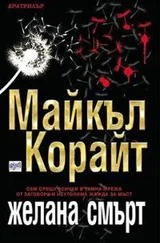She found the handles and pushed, then pulled. Rust flaked off and bit into her palms, and the doors grated over the rough concrete floor, a menacing, grinding sound like the time Shannon had broken the garbage disposal by filling it with Mom’s pill bottles. Her hands ached and her shoulders throbbed, but the space between the doors widened slightly, more daylight flooded in, and she felt warm air on her face, and though there was no way she could slip through and escape, she thought the gap was wide enough that she might at least be heard.
She put her face close to the door and shouted for Jaylen over and over.
No one came. She could hear birds and the faint sound of a passing car, but no one answered her.
I’m trapped, she thought. I will be here forever, somehow I found a staircase that no one else will find, they can search the whole house but they will never find me because the staircase won’t be there, it was a trap, and I—
“Damn it, Tara, what the hell were you thinking?”
Her sister’s voice came through the doors. Then Shannon’s face was in the two-inch gap Tara had opened between the monstrous old doors, and she was staring at Tara with anger and concern.
“Are you okay?” Shannon said. “Are you hurt?”
Tara sniffled out that no, she wasn’t hurt, and yes, she was probably okay, she was just scared and she wanted out .
“I’ll get you out,” Shannon said. “Let me get your dumb boyfriend. I think he’s scared of me.”
With the help of an aluminum baseball bat, Jaylen and Shannon were able to pry the doors far enough apart for Tara to wedge herself through and back to freedom. She was covered in cobwebs and dirt and her shin and arm were bleeding, but she was safe again.
Shannon hauled her home, lecturing her the whole way; Jaylen said good-bye and started to offer Tara a whispered apology but Shannon shot him a look, which accelerated his exit. Once the sisters got back, Shannon told their mother that the car was making a weird noise, which drew her out of the house and into the driveway and let Tara sneak in the back and get herself cleaned up before Mom saw any evidence of her bloody adventure. When she got off the pills, Mom always wanted to play the good-mother role, but by then Shannon had claimed it. Discipline was handled by big sister, period. The same with protection.
Apparently, Shannon thought the scare had been enough for Tara, because she let it drop after extracting a promise from her: never again would she enter that house.
Two days later, Jaylen approached Tara cautiously in the yard, glanced left and right, then said, “Your sister isn’t here, is she?” When Shannon’s absence was confirmed, Tara finally got the twenty dollars and the kiss. A few of the latter, in fact. It turned into a good summer, one of the better ones of Tara’s childhood, and she kept her promise to Shannon. She’d never entered 1804 London Street again.
Until now.
She was locked in again, and she didn’t know the way out, and all around her was fear and shadow. She was on the dark staircase that she hadn’t anticipated, hadn’t even known existed, and this time she didn’t have the option of turning around and going back the way she’d come.
Propped up in her hospital bed, tubes running up her nose and down her throat, machines humming at her side, and her family sitting around her with no idea where she was, Tara realized that her worst fear from the cellar of 1804 had come true. She was trapped, and they would never find her.
This time, there was no thin line of light for her to chase through the blackness.
The neurologist’s name was Dr. Pine. His house in Marblehead was everything a prestigious New England doctor’s home should be — three stories painted an appropriately coastal gray-blue with gleaming white trim and plenty of windows, exquisite brickwork on the driveway and sidewalks, massive brass light fixtures styled to look like old gas lamps. Lisa Boone waited an hour before he finally arrived, pulling up to the house in an equally appropriate Range Rover. He parked in the garage and put the overhead door down behind him, so Boone walked up the brick path that ran to the door on the side of the garage and waited for him to emerge. When he saw her, he stopped short, startled, and took a step back before determining that she posed no threat — an attractive white woman, thank goodness, no danger here.
“May I help you?” he said. His voice was deeper than his stature would suggest.
“Probably not,” Boone said, “but I have to try.”
“Pardon?”
“You have a patient named Tara Beckley. I need to speak with you about her.”
He frowned and studied her, wary now.
“I can’t talk about my patients,” he said, “and I’m curious why you’re at my home.”
“Because the United States government needs you to understand that your patient might have been a casualty of — and, if she lives, potentially a witness to — an execution killing.”
His jaw didn’t quite drop. His mouth parted and then closed. He took a breath, then gave a little shake of his head and a half laugh. “I expect to encounter new things every day,” he said, “but this one is really something. What branch of the U.S. government needs me to understand this?”
“May we go inside, Doctor?”
“What branch?”
“Department of Energy.” She smiled. “Surprised you twice, didn’t I?”
“Yes,” he said. “Come on in.”
She followed him up the back steps and into a kitchen with thick wooden counters and a massive center island. He pulled a stool up to the island, offered one to her, then unbuttoned his cuffs and rolled up his shirtsleeves slowly and precisely. He seemed to be moving methodically to gather his thoughts, and Boone was pleased by his demeanor. She’d expected a flood of questions, but what she needed was someone who could listen.
When he looked up again, he said, “I don’t want to seem foolish or paranoid, but it would probably be prudent to ask you for some identification.”
Wise man. She showed him her ID card, and he studied it with care, even tilting it so that the hologram caught the light.
“‘Office of Intelligence and Counterintelligence,’” he read. “I’ll admit I didn’t know the DOE had their own investigations division. I’d have guessed they’d farm that out.”
“Sometimes. Not always.”
“So what brings the DOE intelligence division into the game?”
Boone knew he was testing her, asking a question that achieved multiple things at once. He wanted to learn how legitimate she was and how much information she’d share, and he wanted to buy himself time to consider the situation while he listened.
“The office protects vital national security information and technologies that represent intellectual property of incalculable value,” Boone said in her best public-speaker-introducing-a-bullshit-politician-at-a-ribbon-cutting voice. “Our distinctive contribution to national security is the ability to leverage the Energy Department’s unmatched scientific and technological expertise in support of policy makers as well as national security missions in defense, homeland security, cybersecurity, intelligence, and energy security.”
“Are you required to memorize that or is it your unique sense of humor?”
“It’s on the website.” She shrugged.
“Nicely done. Not exactly what I was hoping for, though. Would you give me an example of your work?”
Killing a man in a hotel room in Tokyo with a garrote, Boone thought, but the first example to come to mind wasn’t usually the one you should share. She said, “Serving on a joint task force with the FBI and CIA using legal vulnerabilities to motivate employees of a chemical corporation to reveal the covert sharing of patent secrets with the Chinese military.” She paused. “Hypothetically. Of course.”
Читать дальше






![Майкл Корита - Те, кто желает мне смерти [litres]](/books/396555/majkl-korita-te-kto-zhelaet-mne-smerti-litres-thumb.webp)





